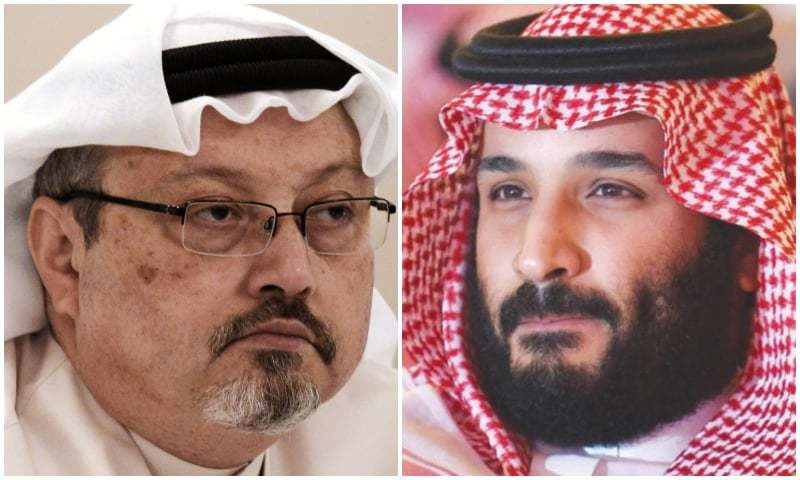
RNA - On top of this, Turkish officials have named 15 Saudi men that they have identified as “operatives” involved in the assassination of Khashoggi. The murderous group included a Saudi Special Forces member, two royal guards, and a chief in the internal security agency.
Of course, Saudi officials still deny that anything at all happened to Khashoggi, claiming he entered the consulate on October 2 and left unharmed. Turkish officials, however, don’t think so. According to CCTV cameras, phone call records by the CIA (they refuse to acknowledge or come forward), and confidential intelligence, he was killed. His body has not been found, but there has been no sign of him since this visit, and this is in no way a murder mystery:
1- Turkish officials have concluded that the order to assassinate Khashoggi came from the highest levels of the Saudi government. President Donald Trump has confirmed that he has talked to officials at the highest levels of the Saudi government as well about the matter.
2- Khshoggi was last seen at 1:14 p.m. local time last Tuesday as he entered the Saudi consulate. Turkish officials, talking to Western media, have described the operation as "quick and complex," and that Khashoggi was killed within two hours of his arrival at the Saudi consulate. The agents "dismembered his body with a bone saw they brought for the purpose. It's like 'Pulp Fiction,'" they told the media.
3- Turkish officials have repeatedly said that Khashoggi has been killed. A friend of the journalist, Turan Kislakci, who is also the head of the Turkish-Arab Media Association, told the Western media that Turkish officials called him and "offered their condolences and told us to be ready for a funeral".
4- That Turkey was so easily able to identify this group, and that they arrived in such a conspicuous manner suggests that the Saudis did little to cover their actions, and may even have figured being implicated would intimidate other dissidents. Closed-circuit television footage, flight trackers, intercepted communications and even rumors of a bone saw can easily help serve pieces of this puzzle.
5- The Washington Post - for which Khashoggi wrote critical columns – says US intelligence intercepted communications of Saudi officials discussing a plan to capture the journalist. The Post says the Saudis wanted to lure Khashoggi back to Saudi Arabia and lay hands on him there.
6- Trump claims he wants the US to get to the bottom of the incident. He told reporters that the US is “demanding everything” and considers the matter a very serious situation, adding the US is working closely with Turkey. Trump is clearly doubling down on his push for answers on the matter. He’s not the only one, with Congressional leaders that usually side with Saudi Arabia on all things even starting to ask questions. In that case, the next best move by Washington is to ask the CIA to release their records on phone calls before the murder happened. Yes, they always keep phone call records of everyone up until five years.
7- US Sen. Lindsey Graham (R-SC) spoke to reporters Wednesday, October 10, reporting that it would be a “game changer” if the Saudis had in any way mistreated Khashoggi. Since early indications are that the Saudis had him killed and chopped him into bits, that’s going to be tough for Graham to back away from if this turns out to be the case, which, indeed, is the case. Because Sen. Graham and Sen. James Inhofe (R-OK) both have warned there would be “hell to pay” if the Saudis were behind the journalist’s disappearance. It seems that’s an even safer bet, and while Graham didn’t want to elaborate on what that meant, he did say he thinks the Saudis “know what it means”.
According to Fars News Agancy, all things considered, and as maintained by Turkish officials, "The Saudis are not cooperating fully with the investigation. They are not open to cooperating." In addition, Saudi authorities have asked Turkish authorities to postpone the search of their consulate in Istanbul. Concerns over Khashoggi’s disappearance have nothing to do with international politics or the geopolitics of the Middle East. For that reason and no other, this particular murder case should prompt calls for investigations from around the world, particularly from the United Nations.
To that end, the Wahhabi regime’s staunchest Western allies, including the United States, where Khashoggi had applied for permanent residency, are equally expected to urge Saudi Arabia to come clean and refrain from double standards. By simply being in touch with the "highest levels" of the Saudi government about Khashoggi's case and/or expressing concerns about his murder, as President Trump would like to suggest, the Saudi regime won’t be pressed enough to reveal more about the murder, much less be held to account in the court of justice.
The Saudi regime might have been able to silence Khashoggi, but it has miscalculated the global impact his murder would have. Under these circumstances and international law, the autocratic regime should never be allowed to escape international justice or else we should wait for more such crimes. It is now the international community's turn to show its choice.
847/940